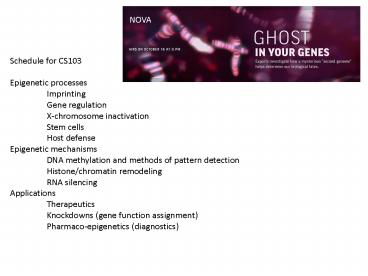Schedule for CS103 - PowerPoint PPT Presentation
1 / 18
Title:
Schedule for CS103
Description:
I will assign reading for each of the topics, starting with imprinting for ... Agouti mice: transposon inserted near agouti gene alters methylation leading to ... – PowerPoint PPT presentation
Number of Views:18
Avg rating:3.0/5.0
Title: Schedule for CS103
1
NOVA
Schedule for CS103 Epigenetic processes Imprint
ing Gene regulation X-chromosome
inactivation Stem cells Host
defense Epigenetic mechanisms DNA methylation
and methods of pattern detection Histone/chromati
n remodeling RNA silencing Applications Therapeu
tics Knockdowns (gene function
assignment) Pharmaco-epigenetics (diagnostics)
2
I will assign reading for each of the topics,
starting with imprinting for October
16th October 16th Epigenetics and
smoking Nature Bird Imprinting (Reik and
Walter, also called imprinting on the
website) Plants vs mammals October 23rd Nature
2006 Berger Branscombe and Jones
methylation Dosage compensation 1 and
2 Embryonic stem cells dna methylation October
30th ES cells Bestor host defense Mechanisms
Li Laird Laird Methods November
6th Methylation Patterns RGLS Plass Plass
methylation analysis RNA directed
bender Jacobson rna directed November 13th
RNAi review 1-7 November 20th November
27th December 3rd
3
Marcus Pembrey, University College,
London Eating/smoking at critical periods cause
epigenetic changes that silence genes in
sperm/eggs Persist beyond generations Smoking 14
,000 pregnant women, 5,400 smoking men boys
weight at nine is highly correlated with when
father started to smoke No correlation with
daughters Food consumption 300 Swedish
families Grandchildren of people who enjoyed
surplus of food had significantly higher
levels of diabetes grandsons not grandaughters
showed phenotype critical periods coincide when
eggs are maturing in girls and sperm production
begins in boys
4
Folic acid is known to be important prenatal
supplement neural tube defects Report describes
how this is mediated by DNA methylation Agouti
mice transposon inserted near agouti gene alters
methylation leading to increased
transcription Phenotype yellow/mottled
coats Litters from dams fed folic acid show
normal coloration Regulatory regions near aguoti
are overmethylated, transcriptional
silencing Axin gene dorsal-ventral axis in
embryos Transposon-mediated disruption of axin
transcription occurs through methylation
Phenotype kinked tail Feeding of folic acid
increases methylation, transponson dysregulation
changed, decrease in kinked tails
5
(No Transcript)
6
Multiple definitions Waddington genotype to
phenotype Riggs (heritable changes without in
DNA sequence Thirdencompases the biology of
chromatin remodeling and RNAi processes Molecular
basis of heritable changes DNA methylation and
polycomb (protein/drosophila) Transgenerational
transmission in peloric variant of
toadflax Involves Lcyc gene methylation
epimutation
7
(No Transcript)
8
Problem with third definition Histone and RNAi
processes tend to be short livedhence problems
with trans-generational transmission Inherent
instability of epigenetic (DNA methylation)
process replication one in 107-108 methylation
96 accuracy (1 in 25)
9
Mammalian imprinting..early 1980s from
uniparental embryos and uniparental
disomy 1990simprinted genes differential
expression of maternal and paternal
genes Imprinted genes have dramatic impact on
fetal growth and subsequent behavior
http//www.mgu.har.mrc.ac.uk/research/imprinting/
10
(No Transcript)
11
Imprinted clusters Rich in CpG islands Clustered
repeats DMRs in parental alleles
12
(No Transcript)
13
(No Transcript)
14
Germ cells vs somatic cells Germ cells induce
erasure so that mature gametes reflect sex of
germ line This is followed by establishment
(controversial) DNMT1 and DNMT3a/b Maintenance
15
(No Transcript)
16
Promoter methylation Antisense transcripts
(Tsix, Xist, etc.) Silencers DMRs that are
heavily methylated on active allele
17
(No Transcript)
18
(No Transcript)































